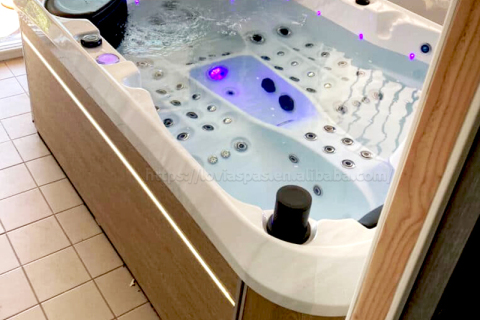
- Home
- >
News
1. Optimize hot water tub configuration Choose an efficient heating system Use a bathtub cover with good thermal insulation performance Efficient circulation pump and filtration system 2. Adjust usage habits Reduce heating time Maintain a reasonable water temperature Reduce heat loss Control frequency of use 3. Regularly maintain and inspect hot water tubs Clean filters Check the power system and equipment status Water quality management
Outdoor hot water tubs are directly exposed to sunlight, which accelerates the decomposition of bromine, thereby reducing its concentration in the water. If a protective cover is not used, especially when exposed to sunlight for a long time during the day, the rate of bromine consumption will increase significantly.
To put it in context, the total weight of an outdoor hot water bathtub filled with water and carrying multiple people can easily exceed 4,000 to 6,000 pounds (1814 to 2721 kg), or even more. This puts the weight density of the outdoor hot water bathtub far beyond the standard load-bearing range that the deck is designed to bear for ordinary activities.
Generally speaking, it is relatively safe to use a hot tub when the outdoor temperature is above 32°F (0°C). Although it is possible to use a hot water tub outdoor in an environment below freezing, this requires ensuring that the hot tub has a good insulation system to prevent the heating system from being overloaded or the equipment from being damaged.
Since the hot tub heater is directly involved in the heating and circulation of water, it inevitably involves the water in the bathtub when replacing the heater. The replacement operation of the hot bathtub heater requires disconnecting the water pump and the pipe system, which usually means that the water needs to be drained to prevent water from overflowing or leaking during the operation.
If chemicals are completely eliminated, the hot tub may quickly become a breeding ground for bacteria and algae. This will bring the following risks: Water turbidity and odor: Contaminants in the water cannot be removed, resulting in turbidity and unpleasant odors. Health hazards: Untreated water may cause skin irritation, eye infections, and even spread diseases (such as Legionella infection).
Generally, the life of a high-quality hot tub heater is between 5 and 10 years. If used properly, cleaned and maintained regularly, some high-end models can even last for more than 10 years. However, if the hot tub is often in a high-load working state or the water quality is poor, the service life of the heater may be significantly shortened.
A standard built 10x10 deck can withstand a weight of about 5,000 pounds (about 2,268 kg). If we calculate the total weight of the hot tub to be 4,202 pounds (about 1,905 kg), then a deck of this size and design can theoretically withstand this weight, but it is close to its limit.
For private hot tubs, which are common in home yards, Florida law is relatively relaxed. Private tubs are generally classified as part of a residential building, so in most cases, no special permit is required for installation and use. However, some specific situations may require special approvals:
Studies have shown that soaking in a hot tub for an hour may burn the same calories as taking a walk or doing a low-intensity exercise. This means that while hot tubs are not a replacement for exercise, they can certainly be used as an aid to weight loss, especially for those who are physically unable to engage in vigorous exercise, as hot tubs offer a low-impact, stress-free way to burn calories.
Weak water flow or no water flow from the nozzle is one of the most direct manifestations of air lock. Air locks prevent the pump from building up enough water pressure, causing the water flow rate of the nozzle to be significantly reduced, or even completely unable to discharge water.
A two-person hot tub with a capacity of 300 liters may take less time to heat up than a 500-liter bathtub. Taking a 3kW heater as an example, it may take about 1.5 hours to heat 300 liters of water from cold water to 40 degrees Celsius, while a 500-liter bathtub may take closer to 2 hours or more.












